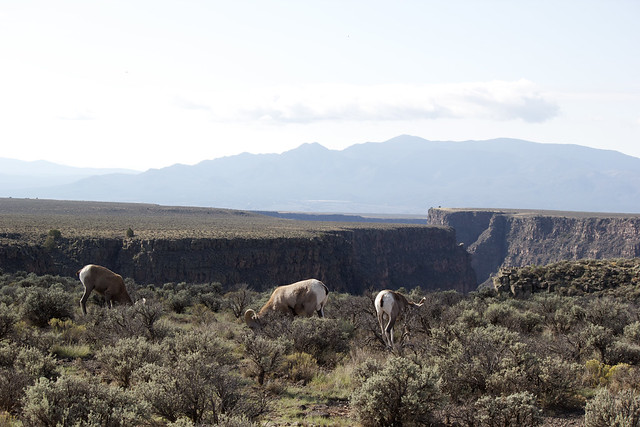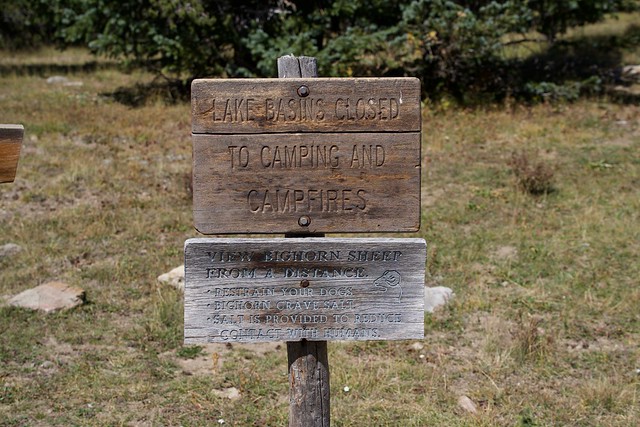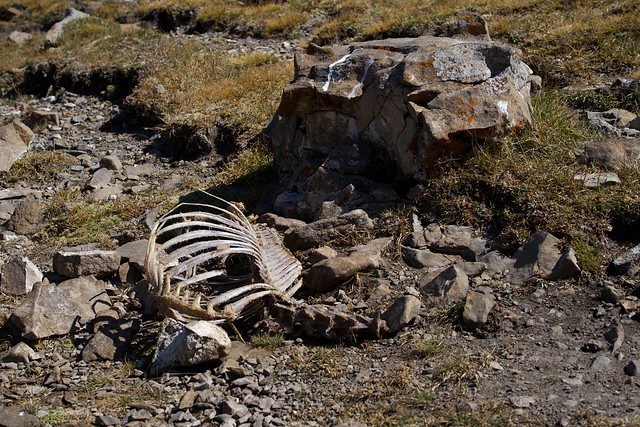"Running With The Herd: A NATURE Short Film" meshes with some recent reading. Rough notes follow.
Flickr
In 2010, on Flickr, I saw photographs of bighorn in the Rio Grande Gorge, taken by a river guide. This created a tiny ambition to see them for myself.
On July 4th, 2011, I took a walk along the West Rim Trail, not really expecting to see anything - after all, this trail is more than 700 feet above the box. But I was lucky, and I got to spend a half hour or so watching three ewes and a lamb feed near the edge of the rim.
A couple of months later I returned and, in nearly the same spot, was stopped in my tracks by three young rams, who grazed right up to where I was standing.

In October, 2012, my luck wasn't so good. I saw only one ewe, from such a great distance that I could barely tell that she was a sheep. Reviewing the photos later, I could see that she was carrying a radio collar.
Why was she wearing a collar? What was the story of interactions between humans and these impressive creatures who, until I saw that collar, I had imagined to be completely wild?
New Mexico Wildlife Center
On July 4, 2015, I was finishing my volunteer shift at the New Mexico Wildlife Center. As I walked out to my car I was met by a weary, late-middle-aged couple. I thought they were going to ask if the Center was open. Instead the lady explained that they had called ahead and were delivering a baby robin, which the man had been hand-raising for the past several days.
This turned out to be one of the most enjoyable afternoons of my recent life. Maybe I'll write it up sometime. For now, the important part is that we passed the next hour or so on the front porch, talking about our respective wildlife encounters.
The man had spent plenty of time watching bighorns in the Taos mountains. And he knew a fair bit about how they had come to be in the Gorge. He explained that they had been introduced only recently, around 2008.
He also told about the old New Mexican sheep herders whom he had befriended when he first moved to Taos, and about the bajadas - the trails – they had used to bring their herds down to the river to drink.
Those bajadas have created a little romantic fantasy in my imagination. The sheepherders are gone, but those trails are still used. I have followed bighorn tracks down some of them. The enduring picture is of a succession of wild sheep, then domestic, then wild again, all finding the same paths down to the water.
Last year I found an article in the Taos News that fleshed out the man's story about how the bighorn came to live along the Rio Grande:
Much like the river otters that now swim in the river at the bottom of the gorge, bighorn sheep were — up until not that long ago — a big part of the order of things in the southern stretch of the Rocky Mountains we call home.
(River otters! That was another wonderful, lucky encounter for me, and the resulting video brought me into contact, through iNaturalist, with one of the people who had helped reintroduce them into the upper Rio Grande. But I digress.)
According to Eric Rominger, bighorn sheep biologist for the New Mexico Department of Game and Fish, bighorns were extirpated in New Mexico around the turn of the 20th century. The last known evidence of a bighorn in New Mexico was a track found in the Truchas Peaks south of Taos.
The reintroduction of the bighorn sheep started in the 1940s when a group of sheep were gathered from Alberta and brought to the Sandias. A herd was started in the Pecos Mountains with a mix of fresh blood from Alberta along with a few Sandia sheep — the founding stock for many of the rest of New Mexico’s herds.
Sheep from the Pecos were brought to the Wheeler Peak Wilderness in 1993. As Michael A. Martinez, hunt coordinator for Taos Pueblo’s wildlife office, said, “Of course, they eventually made their way on the pueblo side. The majority of those bighorns winter on the pueblo side’s abundance of south-facing slopes, moving back to the public side during the summer.”
Then, in 2005, the Taos Pueblo war chief, lead biologist and director of wildlife decided to try to bring the bighorns back to the inverted mountain landscape of the gorge. Taos Pueblo took an initial group of sheep from its side of the Wheeler Peak chain, and the state department supplemented the herd in 2007 with more sheep from the Pecos.
This must be the best combined job title in the world: "Taos Pueblo war chief, lead biologist and director of wildlife."
It bears repeating: I'm deeply grateful for all that Taos Pueblo is doing to care for their home. Bighorn, otters, advocacy for creation of the Rio Grande del Norte National Monument - who knows what else they are doing? The main aim may be to take care of the land, but in doing so they've made it possible for mere mortals to stumble upon amazing animals while out on a day hike.
Beatty's Cabin
This fall I made my first treks into the Pecos north of Cowles. I'd seen photos and video from near the Truchas peaks, of human encounters with proper mountain-dwelling bighorn. I was hoping for similar luck.

Alas, the only bighorn I came across had already had its own, horrible meeting with humans.

This year, through a series of lucky accidents, I finally learned about the book "Beatty's Cabin".
It's a great, revelatory book. (The web carries several wonderful stories about its author, Elliott Barker, who in his lifetime seems to have regarded the Pecos as his ideal place on earth.)
"Beatty's Cabin" backs up the details of the Taos News article. Like the Nature short film, it explains how bighorn have been harmed both by hunting and by close encounters with domestic sheep.
The Rocky Mountain bighorn sheep, also, were indigenous to this
and other areas of the state but their meat was considered the best of all
wild meat and, hence, they were sought after like select items on a bargain
counter.
In 1873, Coues and Yarrow reported sheep were plentiful in the mountains east of Santa Fe (the upper Pecos) but they were to disappear rapidly after that. Tom Stewart told me many times that the last mountain sheep killed in the area was taken by Jim Bullock at the base of Santa Fe Baldy; near Lake Katherine, in 1902; however, naturalist Vernon Bailey reports in his Mammals of New Mexico that he saw unmistakable tracks of mountain sheep in the Truchas Peaks area in 1903.
It is most probable that rifles were not the sole cause of the depletion of these denizens of the high, timber-line area. When domestic sheep were brought into the high country to graze for brief summer periods, they were often infected with scabies and, perhaps, other communicable diseases or parasites which could easily be transmitted to the bighorns. Domestic sheep could be cured of scabies by forcing them to swim through vats of Black Leaf 40 solution, but Nature provided no such method of treatment for the wild bighorns, and they would be defenseless against the ravages of parasitic infections or diseases new to them, just as the Indians were against smallpox, first brought to them by the white man.
"Beatty's Cabin" ends its story of the bighorn in New Mexico with a statement of hope, one that appears to have been fulfilled.
... with the untimely passing of these spectacular creatures, the jagged crags and templed peaks very definitely lost something of their hereditary charm and glory. On timber-line ridges and in the coves, alpine clover each year sends up its velvety, gray-green leaves and pink-white blossoms in supplication for the return of God’s free wild creatures who once fattened upon its succulence. But none return to eat it. The brows of the high, grassy hills, furrowed and wrinkled by unnatural gullies, frown disapprovingly upon the substitution of herds of domestic woollies for the little bands of wild bighorns that once scanned the glorious landscape from their crests. Restoration is past due.
One effort was made, in 1933, by the State Department of Game and Fish to re-establish bighorns in the Pecos high country. Six animals, two bucks and four ewes, were obtained through the courtesy of the Canadian National Park Service from Banff, Alberta, Canada, and released at the west base of the range. A year later the two rams were seen by Forest Ranger J. W. Johnson at the head of the Pecos on the Santa Barbara Divide, but they have not been heard of since and it must be presumed they met the same fate as their native predecessors. With the material reduction of the number of domestic sheep permitted to summer graze this extremely high vulnerable area and the elimination of the dread scabies from the herds, there is now a good possibility that the Rocky Mountain bighorns might yet be restored to their hereditary range. God speed the day!

My Heart Belongs to Nature
I'll give the last word to the man who told those great stories on the patio of New Mexico Wildlife Center – and in his own voice, to boot.



